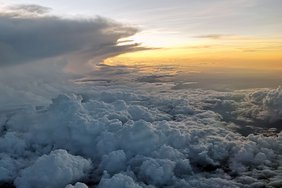The vertical change of temperature, the so-called lapse rate, in the tropical troposphere is governed by the balance of latent heating from deep convection and radiative cooling. The temperatures in the upper troposphere are important for many global circulation systems and climate feedbacks. However, a major criticism of climate model simulations over the past decades has been their overestimation of warming in the tropical upper troposphere, between 8 and 13 km altitude, compared to observations, raising concerns about the accuracy of the simulations.
In this study the authors are able to show that climate models already disagree on the mean tropical lapse rates, even before warming. In their own climate model experiments they demonstrate that this is likely because of the different ways that conventional climate models parameterize convection. For weaker conversion rates of cloud water to precipitation the amount of condensate in the cloud increases, and thereby also the freezing enthalpy, resulting in warmer upper tropospheric temperatures. For weaker entrainment rates the upper troposphere also becomes warmer, since less moisture is lost to the environment by mixing, which allows for more condensation heating.
Finally, the authors show that climate models still overestimate upper tropospheric warming in comparison to most analyses of radiosonde observations. At least part of this bias is due to the fact that the models on average overestimate the amount of upper tropospheric warming in response to a certain lower tropospheric warming, so called amplification. By increasing entrainment (and thereby reducing condensation heating in the upper troposphere) this amplification can be reduced and brought into agreement with observed values.
Original publication:
Keil, P., Schmidt, H., Stevens, B., Bao, J. (2021) Variations of Tropical Lapse Rates in Climate Models and their Implications for Upper Tropospheric Warming. J. of Climate; https://journals.ametsoc.org/view/journals/clim/aop/JCLI-D-21-0196.1/JCLI-D-21-0196.1.xml
Contact:
Paul Keil
Max Planck Institute for Meteorology
Phone: +49 (0) 40 41173 386
Email: paul.keil@mpimet.mpg.de

